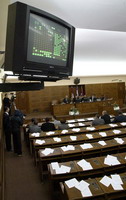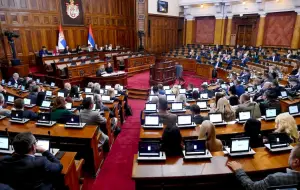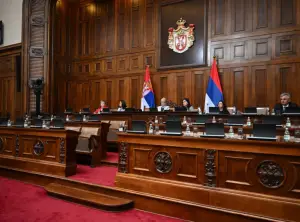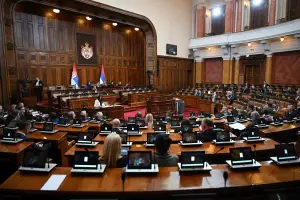Q:
A:
Serbian parliament adopts several laws
Belgrade,
28 November 2005
Serbian parliament members adopted today by a majority vote the Law on prevention of money laundering, which stipulates that every financial transaction that exceeds €15,000 in dinar counter-value must be registered.
This law prescribes that all visitors of banks, betting shops and exchange offices must present their identification cards.
The law widens the circle of those who are required to forward information on transactions of bigger sums or suspicious transactions to the Directorate for Prevention of Money Laundering at the Ministry of Finance. These are banks, insurance organisations, investment funds, broker houses, organisers of games of chance, and dealers in real estate, cars and boats.
The Serbian parliament adopted by a majority vote the amendments to the Law on the Serbian Development Fund and the Law on public companies.
Amendments to the Law on the Serbian Development Fund prescribe that the fund be transformed into a development bank which will approve funds only to the private sector with the aim of boosting the development of small and medium-sized enterprises.
The main task of this fund will be to lend funds to companies that cannot easily get loans under market conditions, with the aim of securing even regional development, and improving the rate of employment and exports.
This Law prohibits that this Fund be recapitalised from the Republic budget because already now its capital stands at €450 million, but it does not prohibit its recapitalisation from private sources.
Amendments to the Law on public companies and performance of activities of general interest prevent monopolistic behaviour of public companies, not only of those established by the Republic, but by local self-governments as well.
All public companies must submit their 2006 programme proposal to the Serbian government by December 1 of this year.
The Law provides legal basis for distribution of a total of 30% of gratuity shares to employees of public companies before the beginning of privatisation, as well as for the distribution of shares to all other citizens of Serbia who haven't been given any shares during privatisation.
The state capital will be transferred free of charge to employees of a public company that is being privatised in two ways: up to 15 percent of the company's capital will be distributed through a public tender, while the other 15 percent will be distributed to citizens through the Share Fund.
The amendments to this law are also aimed at securing the control of rise of prices and salaries in public companies which cannot depart from the frameworks set up by the government's macroeconomic policy. It is envisaged that the consent for the rise in utility prices, apart from the bodies of local self-government, be given by the Ministry of Trade, Tourism and Services. In the case of overrunning the planned growth in prices or wages, the transfer of budgetary funds to local self-governments can be temporarily suspended.
Serbian parliament members adopted today in emergency procedure the Law on banks which envisages the intensification of the control of the work of banks, tighter financial discipline, prohibition of jeopardising competition in the banking market and mechanisms for preventing monopolistic behaviour.
This law, voted for by 128 deputies, stipulates that every bank is required to secure funds for its operations worth at least €10 million in dinar counter-value.
This law empowers the National Bank of Serbia (NBS) to give approval on every purchase of shares which make up more than 5 percent of the bank's capital. This institution also received the right to supervise the whole financial sector.
Banks will no longer be managed by directors, but by an executive board consisting of two members, and the managing and supervisory boards will be kept. However, it is specified that members of these boards will be personally accountable for the operations of banks.
The law establishes a higher responsibility for the auditor, the term "banking secret" is defined, the duty of informing citizens is prescribed, as well as setting up a special organisational part within the bank for risk management.
The government also adopted a package of laws regulating the health sector, such as the Law on Health Insurance which organises the work of state health services in a new and systematic way, and creates a competitive environment by introducing voluntary health insurance.
This law prescribes that all citizens have the right to health insurance, and when the newly-adopted decrees are implemented, there will be no one in Serbia without this kind of insurance.
The Law on Health Protection concerns the division of responsibility when it comes to health protection, defines the rights of patients, and changes the organisation of health services. The law aims to decentralise the organisational and managerial sector in Serbia’s health service, especially on the primary level, which is one of the most important aspects of the reform process.
The Law on Doctors’ Chambers regulates the basis for establishing these chambers as independent professional organisations. The chambers will get considerable public authorisation, which will entitle them to decide independently on issuing, reissuing or revoking of licences for independent work.
The Law on Precursors Used in Illegal Production of Narcotics and Psychotropic Substances should prevent the abuse of these substances and their usage in the production of narcotic drugs. The law also creates conditions for cooperation with the international bureau and the international drug control programme, which should add to a more effective suppression of illegal trade in narcotics.
The Law on the Serbian Red Cross provides this organisation with the position of an independent and humanitarian organisation, and with certain authorisation when it comes to first-aid and voluntary blood donations.
The law widens the circle of those who are required to forward information on transactions of bigger sums or suspicious transactions to the Directorate for Prevention of Money Laundering at the Ministry of Finance. These are banks, insurance organisations, investment funds, broker houses, organisers of games of chance, and dealers in real estate, cars and boats.
The Serbian parliament adopted by a majority vote the amendments to the Law on the Serbian Development Fund and the Law on public companies.
Amendments to the Law on the Serbian Development Fund prescribe that the fund be transformed into a development bank which will approve funds only to the private sector with the aim of boosting the development of small and medium-sized enterprises.
The main task of this fund will be to lend funds to companies that cannot easily get loans under market conditions, with the aim of securing even regional development, and improving the rate of employment and exports.
This Law prohibits that this Fund be recapitalised from the Republic budget because already now its capital stands at €450 million, but it does not prohibit its recapitalisation from private sources.
Amendments to the Law on public companies and performance of activities of general interest prevent monopolistic behaviour of public companies, not only of those established by the Republic, but by local self-governments as well.
All public companies must submit their 2006 programme proposal to the Serbian government by December 1 of this year.
The Law provides legal basis for distribution of a total of 30% of gratuity shares to employees of public companies before the beginning of privatisation, as well as for the distribution of shares to all other citizens of Serbia who haven't been given any shares during privatisation.
The state capital will be transferred free of charge to employees of a public company that is being privatised in two ways: up to 15 percent of the company's capital will be distributed through a public tender, while the other 15 percent will be distributed to citizens through the Share Fund.
The amendments to this law are also aimed at securing the control of rise of prices and salaries in public companies which cannot depart from the frameworks set up by the government's macroeconomic policy. It is envisaged that the consent for the rise in utility prices, apart from the bodies of local self-government, be given by the Ministry of Trade, Tourism and Services. In the case of overrunning the planned growth in prices or wages, the transfer of budgetary funds to local self-governments can be temporarily suspended.
Serbian parliament members adopted today in emergency procedure the Law on banks which envisages the intensification of the control of the work of banks, tighter financial discipline, prohibition of jeopardising competition in the banking market and mechanisms for preventing monopolistic behaviour.
This law, voted for by 128 deputies, stipulates that every bank is required to secure funds for its operations worth at least €10 million in dinar counter-value.
This law empowers the National Bank of Serbia (NBS) to give approval on every purchase of shares which make up more than 5 percent of the bank's capital. This institution also received the right to supervise the whole financial sector.
Banks will no longer be managed by directors, but by an executive board consisting of two members, and the managing and supervisory boards will be kept. However, it is specified that members of these boards will be personally accountable for the operations of banks.
The law establishes a higher responsibility for the auditor, the term "banking secret" is defined, the duty of informing citizens is prescribed, as well as setting up a special organisational part within the bank for risk management.
The government also adopted a package of laws regulating the health sector, such as the Law on Health Insurance which organises the work of state health services in a new and systematic way, and creates a competitive environment by introducing voluntary health insurance.
This law prescribes that all citizens have the right to health insurance, and when the newly-adopted decrees are implemented, there will be no one in Serbia without this kind of insurance.
The Law on Health Protection concerns the division of responsibility when it comes to health protection, defines the rights of patients, and changes the organisation of health services. The law aims to decentralise the organisational and managerial sector in Serbia’s health service, especially on the primary level, which is one of the most important aspects of the reform process.
The Law on Doctors’ Chambers regulates the basis for establishing these chambers as independent professional organisations. The chambers will get considerable public authorisation, which will entitle them to decide independently on issuing, reissuing or revoking of licences for independent work.
The Law on Precursors Used in Illegal Production of Narcotics and Psychotropic Substances should prevent the abuse of these substances and their usage in the production of narcotic drugs. The law also creates conditions for cooperation with the international bureau and the international drug control programme, which should add to a more effective suppression of illegal trade in narcotics.
The Law on the Serbian Red Cross provides this organisation with the position of an independent and humanitarian organisation, and with certain authorisation when it comes to first-aid and voluntary blood donations.











